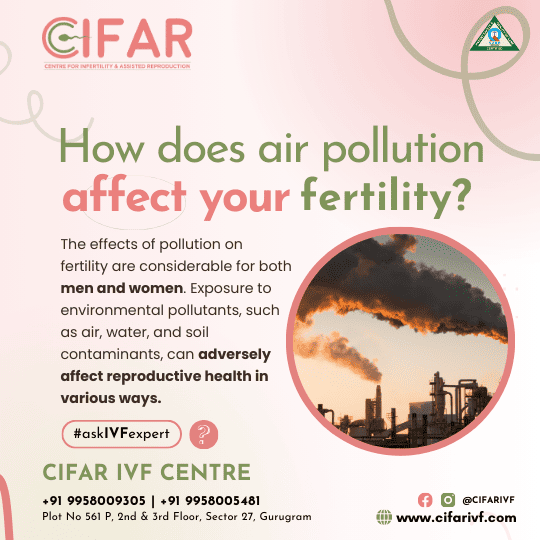The effects of pollution on fertility are considerable for both men and women. Exposure to environmental pollutants, such as air, water, and soil contaminants, can adversely affect reproductive health in various ways.
The real facts Current scenario of air pollution in Delhi NCR
Air pollution in Delhi-NCR has attained critical levels, with the Air Quality Index (AQI) often classified as “severe,” adversely affecting public health and fertility.
An AQI value over 300 indicates hazardous air quality, but Delhi NCR also exceeds these levels.
With mostly automotive emissions (such machine, motor, vehicle), stubble burning, construction area dust, and industrial activities, this major pollution generates dangerous amounts of PM2.5 and PM10 exceeding WHO criteria by a factor of 20.
You need to understand that the major health concern is caused by five major pollutants.
1. Ozone at ground level
2. Particle pollution, which includes PM2.5 and PM10 and is often referred to as particulate matter
3. Carbon monoxide
4. Sulphur dioxide
5. The gas nitrogen
Now let’s delve into how
Male and female fertility could suffer from air pollution.
How does air pollution affects fertility in Male?
- Reduced sperm quality: Many male patients are expressing conditions related to unhealthy lifestyles after being exposed to air pollution for an extended period. Dr. Puneet Rana made these observations after consulting with numerous patients in recent times. She also added that exposure to air pollutants, especially fine particulate matter (PM2.5), has been associated with reductions in sperm count, motility (swimming ability), and morphology (shape).
- Hormonal disruptions: She further added Chemicals like BPA and phthalates can mimic hormones and lower testosterone levels, impairing sperm production.
- DNA damage: Pollutants can produce oxidative stress, which breaks DNA in sperm cells and may result in infertility or birth abnormalities.
How does air pollution affects fertility in Female?
- Endocrine disruption: Dr. Puneet Rana also says similar to men, pollutants can interfere with hormone levels in females, affecting ovulation and menstrual cycles.
- Reduced egg quality: Dr. Puneet Rana Arora, the Director and Founder of CIFAR IVF Centre, also mentioned that women who are trying to conceive or have been living in air-polluted areas for a long time may have a lower ovarian reserve and poorer egg quality, which can make it more difficult to conceive.
- Increase in risk of miscarriages/pregnancy loss: Numerous studies indicate a correlation between exposure to air pollution and increased rates of miscarriage.
What are the Long-Term Effects on Fertility:
- Epigenetic Changes: Dr. Punnet Rana Arora is also apprehensive about the epigenetic modifications triggered by pollution, which can alter gene expression, potentially impacting not only fertility but also the well-being of future generations.
- Delayed Puberty in Offspring: Pollutant exposure can have an impact on a parent’s fertility and child development.
What can you do to protect your fertility when the air quality is bad for a long time?
Dr. Puneet Rana Arora asserts that while it is impossible to completely eliminate exposure to air pollution, there are steps you can take to reduce your risk.
- Reduce exposure: Try to Limit time spent outdoors during periods of high air pollution, especially during peak traffic hours.
- Air purifiers: Use air purifiers with HEPA filters in your home and workplace to filter out pollutants.
- Use N95 masks : Both male and female fertility can be adversely affected by exposure to contaminants such as particulate matter (PM2.5), industrial chemicals, and pesticides. N95 masks substantially reduce the inhalation of these harmful substances, thereby minimising their potential impact on reproductive health.
- Healthy lifestyle: Try to Maintaining a healthy lifestyle, including a
- Always use balanced diet,
- Do regular exercise, and
- Try to manage stress levels; that can help improve your overall reproductive health.
- Eat antioxidant-rich foods: Antioxidants combat oxidative stress caused by pollution.
- Consult IVF specialists: Seek advice from fertility experts for additional support, especially if trying to conceive in polluted regions.
Final Conclusion
Although the studies on air pollution and fertility are still under progress, further investigations are required to completely grasp the degree of the issue.
Still, the data at hand points to air pollution as a major hazard to reproductive health, therefore we must act to safeguard our future families and ourselves.
Note : This is for informational purposes only. For medical advice or diagnosis, consult a professional.


Add Your Comment